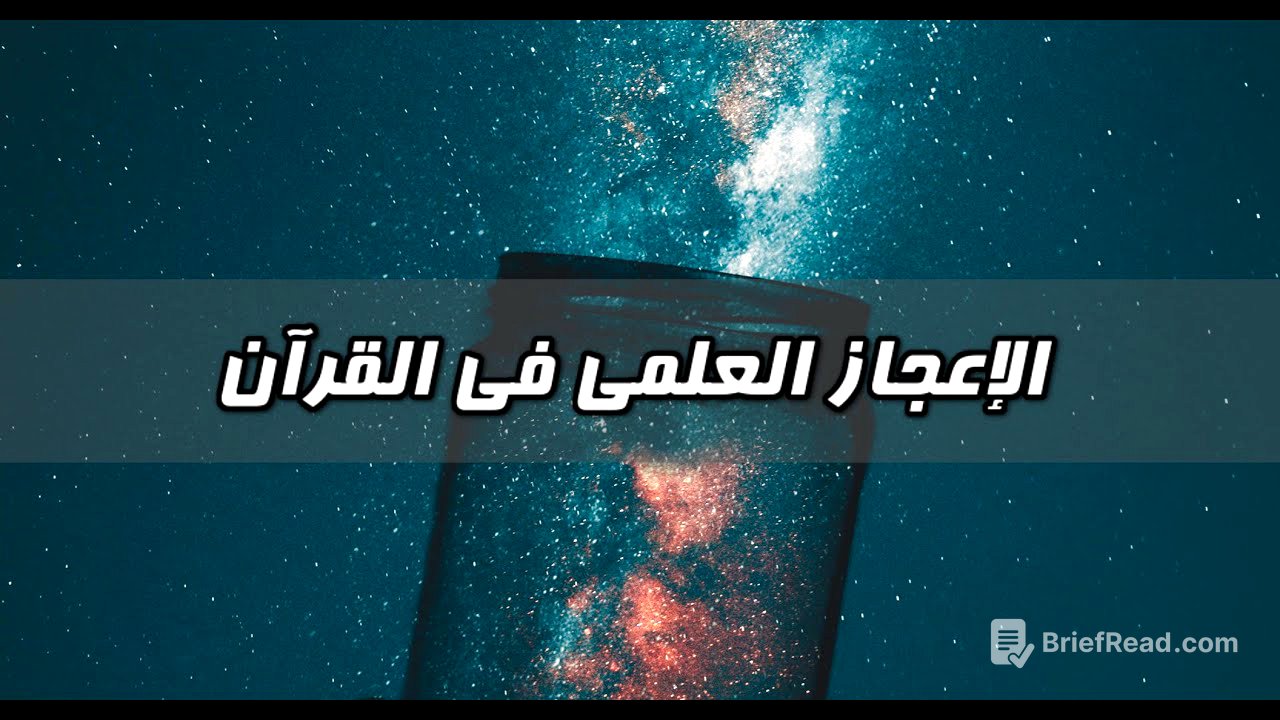TLDR;
This video critiques the concept of "scientific miracles" in the Quran, arguing that they are based on flawed logic and misinterpretations. It identifies three main issues: cherry-picking and falsifying information, the inherent limitations of science when compared to religious texts, and logical fallacies in the arguments presented by preachers. The video encourages viewers to critically evaluate claims of scientific miracles using objective reasoning.
- Claims of scientific miracles in the Quran often involve taking verses out of context and misinterpreting them to align with scientific discoveries.
- Science, being based on observation and subject to change, cannot be definitively reconciled with religious texts that are considered absolute truths.
- Arguments for scientific miracles often rely on logical fallacies such as begging the question, cherry-picking, and false conclusions.
Intro [0:00]
The video introduces the topic of scientific miracles in the Quran, a subject that initially attracted the speaker to Islam but later became a source of doubt. The speaker explains that the video will explain why the concept of scientific miracles is fundamentally flawed.
Three Main Issues with Scientific Miracles [0:57]
The video outlines three main issues that undermine the concept of scientific miracles in the Quran: cherry-picking and falsifying information, the nature of scientific claims versus religious claims, and logical failures in the arguments presented. These issues are illustrated with examples and logical analysis.
Cherrypicking and Falsifying: The "Smoke" Example [1:02]
The video analyzes a popular claim that the Quran's mention of "smoke" (Surah Fusillat, verse 11) aligns with the scientific understanding of the universe's origin. The speaker argues that this claim involves cherry-picking by ignoring the verses before and after, which state that the Earth was created before the heavens. Additionally, the interpretation of "smoke" as cosmic dust is a falsification, as classical Islamic scholars understood it to be evaporated water that formed the sky. The video references Surah Hud, verse 7, and Sahih al-Bukhari 3191 to prove that water existed before the Earth and Heavens.
The Problem with the Concept of Scientific Miracle [9:00]
The video explains that the concept of scientific miracles relies on the idea that the Quran contains scientific information that was impossible to know 1500 years ago and has only recently been discovered. The speaker argues that this concept is problematic because science is based on induction and limited human knowledge, and therefore does not offer absolute truths. Comparing the Quran, which is considered to be composed of absolute facts, with science, which is composed of temporary facts, is an insult to God's knowledge.
Logical Failure: Begging the Question Fallacy [11:18]
The video explains that the concept of scientific miracles is built on three logical fallacies, and the first one is the 'Begging the Question Fallacy'. The speaker explains that after preachers present their alleged miracles, they ask the question: "How could Mohammed have known this?". The speaker argues that this question assumes that Mohammed had communication with an entity outside the universe without providing any proof. The speaker explains that the only honest answer is "I don't know".
Logical Failure: Cherrypicking Fallacy [15:20]
The video explains that the second fallacy used to build the idea of scientific miracles is called "Cherrypicking". The speaker explains that cherrypicking is when someone brings a certain argument and only picks evidence in favor of it, while ignoring all the evidence or information that goes against it. The speaker gives examples of scientific miracles that are never talked about, such as "The stars which stone devils" or "The earth is flat".
Logical Failure: Non Sequitur Fallacy [16:46]
The video explains that the last fallacy is the "Non Sequitur Fallacy", also called the "False conclusion Fallacy". The speaker explains that even if there is real information in the Quran, it can't be concluded that the Quran is from Allah. The speaker explains that a piece of information being correct tells nothing about the source of this information. The speaker gives an example of a 5000 year old book that has scientific claims that turn out to be valid after experimentation, and it's also written that this book came from the Flying Spaghetti Monster. The only justifiable claim is that we found a 5000 year old book which contains correct scientific information, and also contains a claim which is unsubstantiated, which is that it's from the Flying Spaghetti Monster.
Conclusion [20:48]
The speaker concludes by addressing those who question his departure from Islam despite the supposed scientific miracles. He argues that these "miracles" are a last-ditch effort to keep the religion alive after it has been challenged scientifically, logically, and morally. The speaker encourages viewers to use the objective methods discussed in the video to evaluate claims of scientific miracles independently and to think critically.









